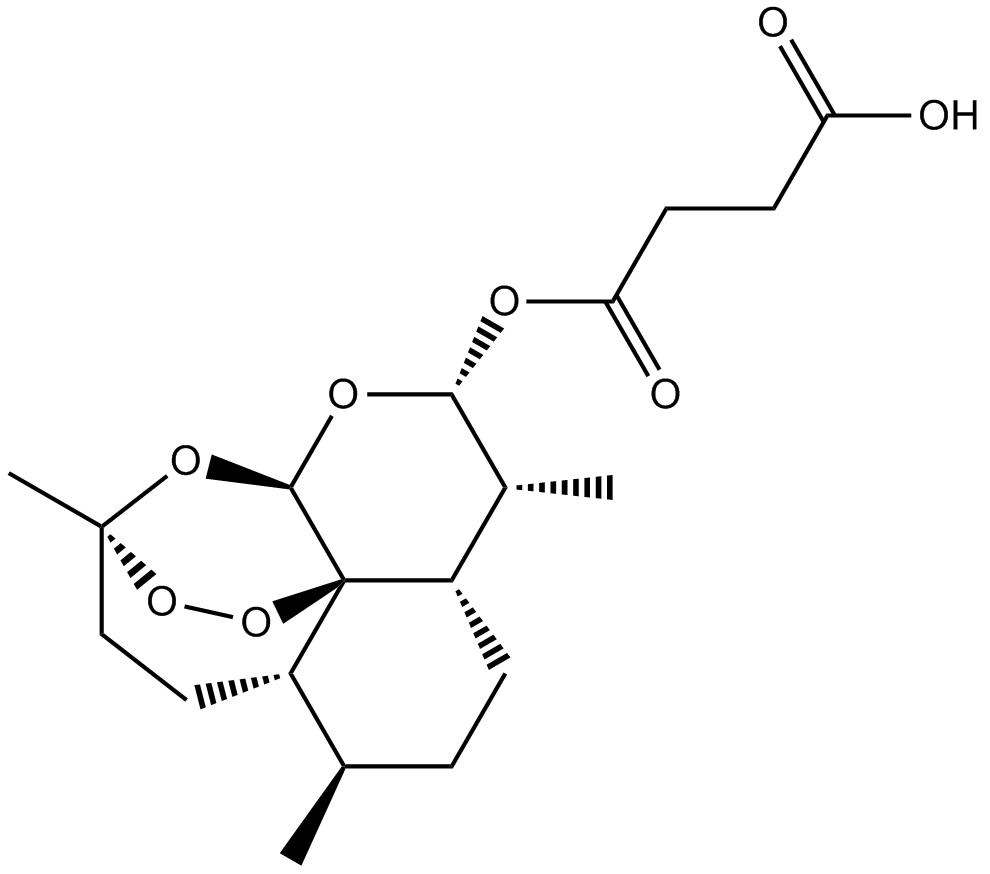Artesunate (Synonyms: Artesunic Acid, NSC 712571, WR 256283) |
| カタログ番号GC10889 |
自然産物アルテミシニンの導関数
Products are for research use only. Not for human use. We do not sell to patients.

Cas No.: 88495-63-0
Sample solution is provided at 25 µL, 10mM.
アルテスナートは、STAT-3とエクスポーテッドプロテイン1(EXP1)の両方の阻害剤です。
アルテスナートは、STAT-3[1]および輸出タンパク質1(EXP1)[2]の両方の阻害剤です。細胞株の両方において、24時間のアルテスナート処理により、反応性酸素種(ROS)レベルが投与量依存的に有意に増加することが示されました。さらに、ウェスタンブロッティングでは、癌細胞が高用量範囲でアルテスナートを処理した場合、γ-H2AXレベルが有意に上昇することが示されました。また、アルテスナートはA2780およびHO8910細胞のRAD51レベルに時間依存的な効果を示します。正常人線維芽細胞や不死化上皮細胞FTE-187などの非悪性細胞2種類では、RAD51レベルはアルテスナートで変化しませんでした。しかしA2780細胞では、RAD51 mRNAレベルは投与量依存的に減少しました。同様にRAD51プロモーター活性も有意に抑制されます。一方H8910細胞ではRAD51 mRNAレベルは影響を受けませんでした[3]。
アルテスナートとシスプラチンの併用治療を受けたグループでは、腫瘍の成長が有意に減少しました(P<0.01)。一方、アルテスナート単独では両細胞株の腫瘍移植物の成長に対して有意な影響はありません[3]。
References:
[1]. Ilamathi M, et al. Artesunate as an Anti-Cancer Agent Targets Stat-3 and Favorably Suppresses Hepatocellular Carcinoma. Curr Top Med Chem. 2016;16(22):2453-63.
[2]. Lisewski AM, et al. Supergenomic network compression and the discovery of EXP1 as a glutathione transferase inhibited by artesunate. Cell. 2014 Aug 14;158(4):916-928.
[3]. Wang B, et al. Artesunate sensitizes ovarian cancer cells to cisplatin by downregulating RAD51. Cancer Biol Ther. 2015;16(10):1548-56.
Average Rating: 5 (Based on Reviews and 34 reference(s) in Google Scholar.)
GLPBIO products are for RESEARCH USE ONLY. Please make sure your review or question is research based.
Required fields are marked with *




















